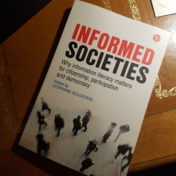Blog
Digital Technology and the Resurrection of Trust
“A country’s education system needs to prepare its people for their role as citizens. In the digital world, this means they need to be empowered to be critical, digitally literate consumers of information.” These couple of lines read like an extract from […]
Informed Societies
Why information literacy matters for citizenship, participation and democracy By Stéphane Goldstein It’s been two years in the making, but at long last, I’m pleased to announce the publication of the book that I’ve edited, ‘Informed Societies: why information literacy matters for citizenship, participation and democracy’. The title, published by Facet, is available here. This […]
The UN, extreme poverty, austerity… and libraries
Last year, I wrote about how public libraries are increasingly providing advice and assistance for claimants of Universal Credit (UC) – the UK Government’s new framework for making social security benefits payments. I pointed out how this was starting to put pressure on some library services. A few days ago, this issue cropped up again, from an unexpected source, in the context of a United Nations-sponsored report […]
MisinfoCon or the many paths to address misinformation
The MisinfoCon roadshow rolled into London on 24 October, with a packed, day-long event at the Royal Society of Arts, in London. For those not in the know, MisinfoCon is a “global movement focused on building solutions to online trust, verification, fact checking, and reader experience in the interest of addressing misinformation in all of its forms” […]
Algorithms: generating a public dialogue
On 1 October, I attended a workshop to present the findings of a project aimed at improving the fairness and transparency of online platform algorithms. The UnBias project, bringing together researchers from the universities of Oxford, Nottingham and Edinburgh
Disinformation and digital literacy: proposals from Parliament
A few days ago, the House of Commons Digital, Culture, Media and Sports Committee published its long-awaited preliminary report on disinformation and fake news. This follows from a lengthy inquiry (to which InformAll and the CILIP Information Literacy Group made a submission) that has been running for a year and a half. I have reported […]
Fake news, Parliament and the psychology of misinformation
As previously reported here, the UK Parliament is running an inquiry into fake news. During 2017, the House of Commons Digital, Culture, Media and Sport Committee collected written submissions from interested parties. More recently, it has taken oral evidence; on 23 January, it invited three academics to provide a perspective with significant bearing on information […]
UK Digital Strategy – a missed opportunity
In early March 2017, the UK Government published its long-awaited Digital Strategy. As set out in the foreword by Karen Bradley, the Secretary of State at the Department of Culture, Media and Sport (DCMS), the Strategy’s ambition is to to “create a world-leading digital economy that works for everyone”. The reference to the economy is […]
![InformAll [logo]](https://www.informall.org.uk/wp-content/themes/informall/assets/img/informall-logo.svg)









